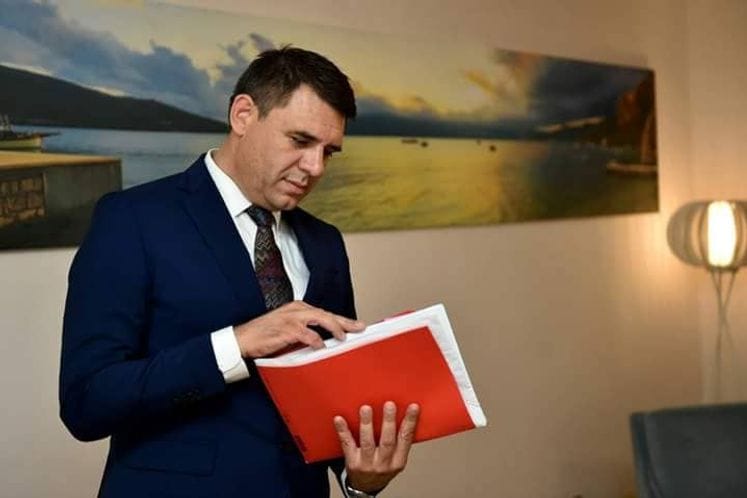- Government of Montenegro
Ministry of European Affairs European regulations to boost competitiveness of t...
Please note: The page below represents the archived content relating to the previous Government of Montenegro. Some of the information might be inaccurate or outdated.
Archive
European regulations to boost competitiveness of the economy

Published on: Sep 2, 2018 • 9:07 PM Author: KEI
The Chief Negotiator with the European Union, Aleksandar Drljevic, has said that application of European regulations and standards under Chapter 17 – Economic and Monetary Union, will contribute to the stability of prices, and boost the competitiveness of the national economy, ensuring the maintenance of macroeconomic security.
"Adoption and application of European policies and procedures will improve the overall economic environment, which will reflect on the social development and the quality of life. This will also prepare Montenegro's economy to be an equal player in implementation of the common economic policy," Drljevic told Mina-business agency.
Commenting on the specific features of negotiations under Chapter 17, given the monetary regime in Montenegro, which has been using the euro as the official currency since 2002, he said that the euro as an official tender in Montenegro would not be called into question.
"It is a fact that the use of the euro as the official currency in Montenegro is a separate issue from the membership in the Economic and Monetary Union," Drljevic said, adding that Montenegro was determined to meet the convergence criteria for joining the euro area, with certain modification, during the negotiation process.
He reminded that the euro regulatory requirements and standards of the EU had been met, as stated in the European Commission's Montenegro Progress Reports, under the part of Chapter 32 dealing with the protection of the euro from counterfeiting.
Drljevic said that the opening of Chapter 17 was a recognition that Montenegro had met the EU's expectations in that field and that it had made the progress expected in that phase of negotiations.
"Further alignment with European regulations is ahead of us, as well the strengthening of administrative capacities for their efficient application," Drljevic said, adding that the greatest challenge in that respect would be related to the constitutional amendments, requested by the European Commission, related to harmonization of the Central Bank's goal with the one of the European System of Central Banks.
He added that Montenegro needed to continue to work on the strengthening of fiscal stability and fulfilment of the market economy requirements.
Drljevic said that application of statistical standards ESA2010 will be a particular challenge in that process, adding that the technical assistance of experts from the EU member states would be provided.
"There is plenty of challenges and work ahead of us. Given the importance of this chapter for Montenegro's economy, we have already launched the demanding activities, which will be continued in the coming period, in order to ensure further economic and financial growth by strengthening economic activities and competitiveness of the national economy," said Drljevic.
This article was published with the financial support of the European Union available within the framework of the project “Dealing with Ethics and Fake News” IPA2018/397-252. The Mina agency assumes full responsibility for its contents, which do not necessarily reflect the position of the EU.
Agency Mina-business
"Adoption and application of European policies and procedures will improve the overall economic environment, which will reflect on the social development and the quality of life. This will also prepare Montenegro's economy to be an equal player in implementation of the common economic policy," Drljevic told Mina-business agency.
Commenting on the specific features of negotiations under Chapter 17, given the monetary regime in Montenegro, which has been using the euro as the official currency since 2002, he said that the euro as an official tender in Montenegro would not be called into question.
"It is a fact that the use of the euro as the official currency in Montenegro is a separate issue from the membership in the Economic and Monetary Union," Drljevic said, adding that Montenegro was determined to meet the convergence criteria for joining the euro area, with certain modification, during the negotiation process.
He reminded that the euro regulatory requirements and standards of the EU had been met, as stated in the European Commission's Montenegro Progress Reports, under the part of Chapter 32 dealing with the protection of the euro from counterfeiting.
Drljevic said that the opening of Chapter 17 was a recognition that Montenegro had met the EU's expectations in that field and that it had made the progress expected in that phase of negotiations.
"Further alignment with European regulations is ahead of us, as well the strengthening of administrative capacities for their efficient application," Drljevic said, adding that the greatest challenge in that respect would be related to the constitutional amendments, requested by the European Commission, related to harmonization of the Central Bank's goal with the one of the European System of Central Banks.
He added that Montenegro needed to continue to work on the strengthening of fiscal stability and fulfilment of the market economy requirements.
Drljevic said that application of statistical standards ESA2010 will be a particular challenge in that process, adding that the technical assistance of experts from the EU member states would be provided.
"There is plenty of challenges and work ahead of us. Given the importance of this chapter for Montenegro's economy, we have already launched the demanding activities, which will be continued in the coming period, in order to ensure further economic and financial growth by strengthening economic activities and competitiveness of the national economy," said Drljevic.
This article was published with the financial support of the European Union available within the framework of the project “Dealing with Ethics and Fake News” IPA2018/397-252. The Mina agency assumes full responsibility for its contents, which do not necessarily reflect the position of the EU.
Agency Mina-business
Related articles:
Twenty-sixth Newsletter on European integration Dec 29, 2023
Is this page useful?
